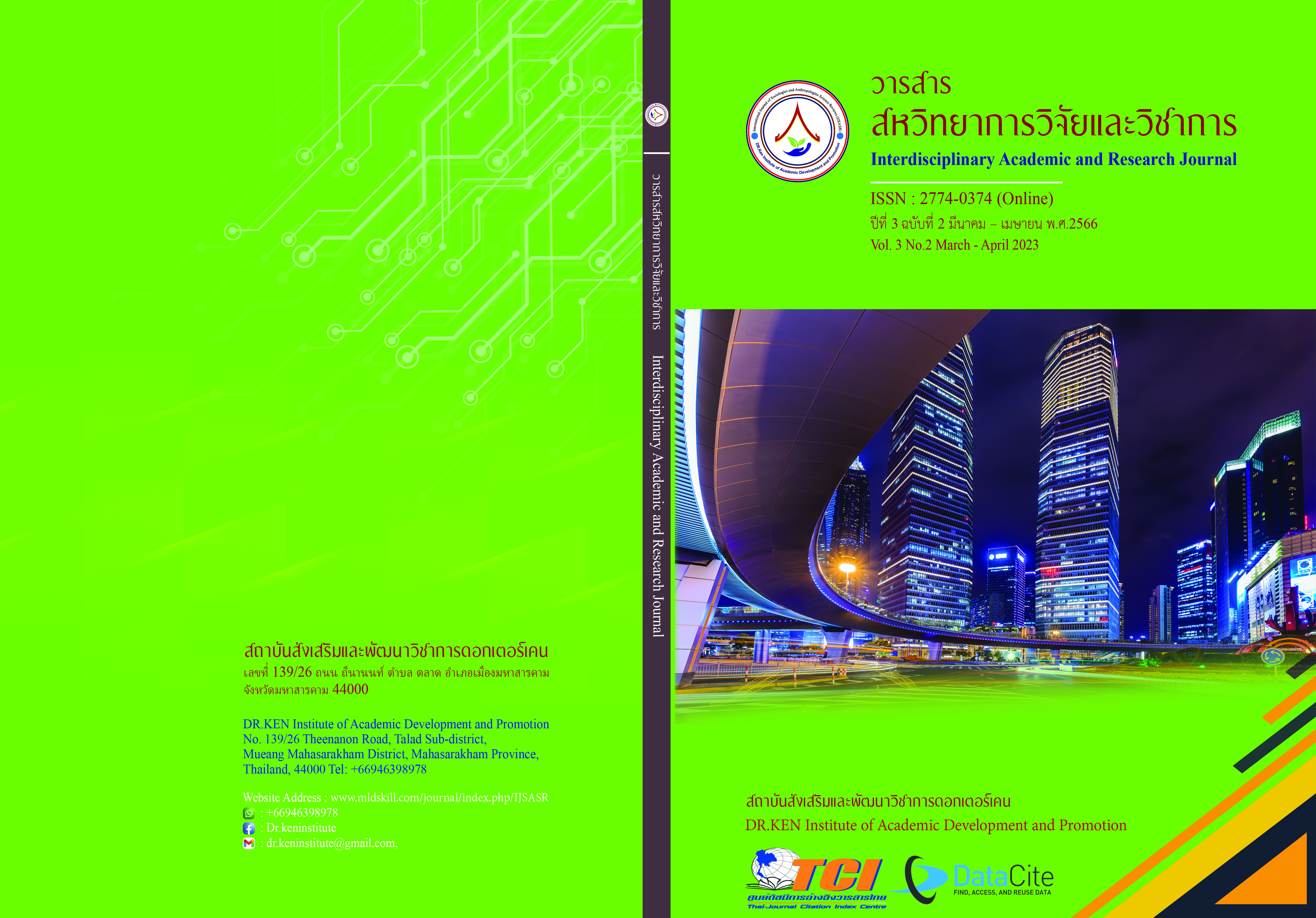Administration According to Good Governance Principles of Educational Institute Administrators at Sattahip Technical College
DOI:
https://doi.org/10.14456/iarj.2023.82Keywords:
School Administration; , Good Governance Principles; , School AdministratorsAbstract
School administration is the main task of the administrators who must systematically formulate patterns, methods and procedures for their implementation. Because if the management system is not good, it will affect other parts of the organization. Good administrators must know how to choose appropriate and effective management methods in order to achieve their goals. Good governance is an important administrative principle and necessary in the current situation, especially in education management, it is the most important factor. The objectives of this research were (1) to study the administrative level according to the principles of good governance of administrators of Sattahip Technical College according to the opinions of personnel. And (2) comparing the administrative levels according to the principles of good governance of administrators of Sattahip Technical College classified by gender, status, and work experience. The population in this study was personnel in Sattahip Technical College in the academic year 2022 consisting of 251 personnel. The research tool was a questionnaire on the governance administration of school administrators at Sattahip Technical College. The statistics used in the research were frequency, mean, percentage, standard deviation, F-test, and t-test. The results showed that (1) The overall level of opinions towards the administration according to the principles of good governance of Sattahip Technical College administrators was at a high level. And (2) the comparative analysis of the opinions towards the administration according to the principles of good governance of the administrators of Sattahip Technical College found that (a) Classified by sex, the overall difference was statistically significant at the .05 level, (b) Classified by overall status differs significantly at the .05 level, and (c) Classified by work experience, the overall difference is statistically significant at the .05 level.
References
บุญชม ศรีสะอาด. (2553). วิธีการทางสถิติสาหรับการวิจัย เล่ม 1. กรุงทพฯ: สุวีริยาสาส์น.
บุญสืบ โพธิ์ศรี และธีระวัฒน์ จันทึก. (2559). การบริหารหลักสูตรเพื่อสร้างคุณลักษณะแรงงานฝีมืออาชีพในระดับอาชีวศึกษา. Veridian E-Journal, Silpakorn University, สาขามนุษยศาสตร์ สังคมศาสตร์ และศิลปะ, 9(1), 1268-1287.
ปิยณัฐ ทั่งจันทร์แดง. (2564). การใช้หลักธรรมาภิบาลในการบริหารงานโรงเรียนศรีบุญเรืองวิทยาคาร สังกัดสำนักงานเขตพื้นที่การศึกษามัธยมศึกษา เขต 19. วารสาร มจร อุบลปริทรรศน์, 6(2), 301-314.
พิชาญ สุมงฺคโล. (2564). แนวทางการบริหารตามหลักธรรมาภิบาลของโรงเรียนพระปริยัติธรรมแผนกสามัญศึกษา ในจังหวัดกาฬสินธุ์. วิทยานิพนธ์ การบริหารการศึกษา. มหาวิทยาลัยมหาจุฬาลงกรณราชวิทยาลัย.
มูฮามัดตอยูดีน เจ๊ะเเว. (2565). ประสิทธิภาพการบริหารงานของผู้บริหารสถานศึกษาตามการรับรู้ของผู้บริหารและครู สังกัดสำนักงานเขตพื้นที่การศึกษามัธยมศึกษา ปัตตานี. การค้นคว้าอิสระ การบริหารการศึกษา. มหาวิทยาลัยราชภัฎยะลา.
วิชุดา ดวงจุ้ย และ ในตะวัน กำหอม. (2564). การบริหารตามหลักธรรมาภิบาลของผู้บริหารสถานศึกษาจำนวนโรงเรียนอนุบาลเทศบาลอ้อมน้อย 2. วารสารวิจยวิชาการ, 4(1), 47-59.
สำนักงานคณะกรรมการการพัฒนาเศรษฐกิจและสังคมแห่งชาติ. (2559). แผนพัฒนาเศรษฐกิจและสังคมแห่งชาติฉบับที่สิบสอง พ.ศ. 2560 - 2564. กรุงเทพฯ : สำนักงานคณะกรรมการพัฒนาเศรษฐกิจและสังคมแห่งชาติ สำนักนายกรัฐมนตรี.
สำนักนายกรัฐมนตรี. (2562). แนวการสร้างระบบบริหารกิจการบ้านเมืองและสังคมที่ดี. กรุงเทพฯ : สำนักนายกรัฐมนตรี.
Downloads
Published
How to Cite
Issue
Section
License
Copyright (c) 2023 เทิดศักดิ์ ตราชูธนวัฒน์

This work is licensed under a Creative Commons Attribution-NonCommercial-NoDerivatives 4.0 International License.
Copyright on any article in the Interdisciplinary Academic and Research Journal is retained by the author(s) under the under the Creative Commons Attribution-NonCommercial-NoDerivatives 4.0 International License. Permission to use text, content, images, etc. of publication. Any user to read, download, copy, distribute, print, search, or link to the full texts of articles, crawl them for indexing, pass them as data to software, or use them for any other lawful purpose. But do not use it for commercial use or with the intent to benefit any business.
















.png)


